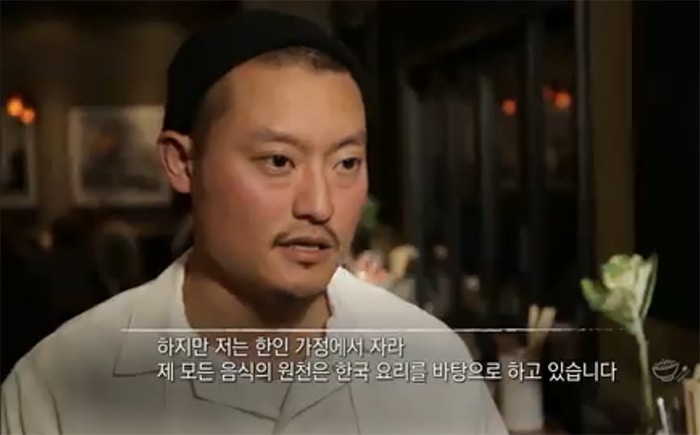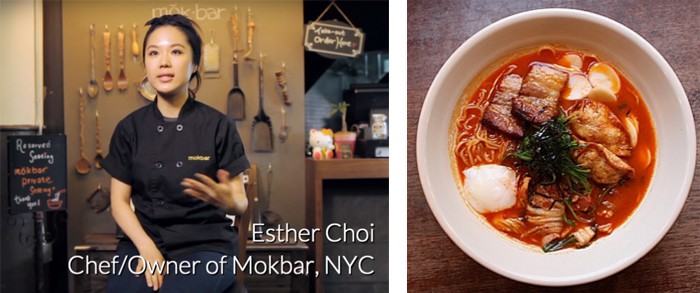For many years now, Korean cuisine has been sailing into the mainstream of North American cooking trends. Now, a new wave of second generation Korean-American chefs are adding their modern twist to the flavors of their childhood comfort foods.
Comfort food and home cooking evokes memories of familiar dishes made by mom or grandma while growing up. It’s often these very personal experiences that define the core of a chef’s food philosophy. A recent documentary, “The rebirth of Korean comfort food in America” made by the Korea Broadcasting System (KBS), interviewed Korean-American chefs in various cities to find out how comfort foods have inspired them and, in turn, tickled the taste buds of the U.S. public.

In an interview for the KBS documentary ‘The rebirth of Korean comfort food in America,’ Chef Dennis Lee from the San Francisco restaurant Namu Gaji says growing up with his mother’s Korean cooking influenced his own style of cuisine.
The documentary introduces viewers to the San Francisco restaurant Namu Gaji run by three brothers: Dennis, Daniel and David Lee. They credit their mother’s cooking as the main inspiration for the dishes served at the restaurant. Before opening the eatery, Chef Dennis Lee and his mother took a trip to their relatives’ homes in Sunchang, Jeollabuk-do Province, to train his palate to the different styles of traditional, home-cooked dishes. For Chef Lee, this rich culinary experience serves as the foundation for all of his creations.

Chef Esther Choi of Mokbar in New York is interviewed by Food Republic (left) and asked about her spicy Korean-style ramyeon. They’re made using chicken broth inspired by her grandma’s samgyetang dish, a ginseng chicken soup. (Photo from Mokbar Instagram.)
In New York, Chef Esther Choi of Mokbar is causing a stir on the city’s noodle scene with her spicy Korean-style ramyeon inspired by her grandma’s cooking.
Chef Choi explained that she learned her food philosophy from her grandmother, who taught her that love is the most important ingredient. She currently makes eight different types of kimchi at her restaurant, using her grandma’s recipes, and said she’s eager to introduce a wide variety of Korean comfort food to her customers. She expressed her desire to “transform Korean cuisine into the kind of food that people worldwide crave on a daily basis.”

Cupbop, which started two years ago as a food truck in Salt Lake City, has since grown into a caterer that can be found all around Utah. This advertisement for the brand’s signature dish can be seen on food trucks across the state. (Photo from Cupbop Facebook.)
The documentary also visited the headquarters of Cupbop, a restaurant whose name in Korean is a play on “rice in a cup.” The business has taken off in Salt Lake City, Utah, and was started two years ago by three Korean college graduates after they learned that the concept of to-go rice cups were gaining popularity back in Korea. The business started in a food truck and has since grown into a catering business for big enterprises. These days, Cupbop serves between 500 and 600 customers at business catering events. Cupbop has also become a mainstream snack at basketball games in Utah. Recently, the founders began a social dining meet-up group called Bop Sim that introduces Korean food and traditions to members of the community.
Finally, Matthew Rodbard, author of the cookbook “Korea Town,” talked about the rising wave of young Korean-American chefs and restaurant owners. He said that, “Second generation Korean-Americans are elevating Korean cuisine using their experiences of growing up in Korean households. They’re preparing traditional dishes with passion and raising the standard of Korean cuisine across the country.”
By Lee Hana
Korea.net Staff Writer
hlee10@korea.kr























